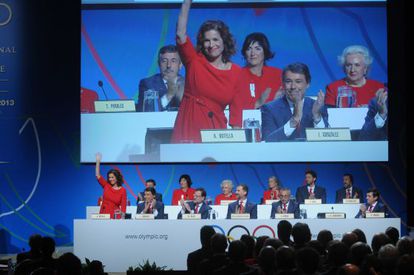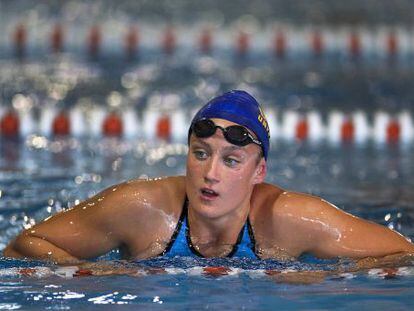Just what was the cost of Madrid’s failed Olympic dream?
Ahead of the release of the official figures, EL PAÍS reconstructs the bill for opting for the Games

"We're all paying for this," muttered a disgruntled civil guard when the Madrid 2020 delegation arrived at Madrid's Barajas airport, after the city had lost out on the Olympic Games in Buenos Aires. The Air Europa flight, which was carrying politicians, athletes, businessmen and journalists, was paid for by the airline. Accommodation in Argentina came from the coffers of the bid, which had been partly filled with public money.
Air Europa's contribution was one of a series of private sponsorship deals for Madrid's candidacy, which topped up funds from the city and region's coffers. The full budget for Madrid 2020 is due to be made public soon. In the meantime, EL PAÍS has used official accounts and reports, as well as explanations from members of the bid team, to estimate the direct costs of the capital's third failed attempt to secure an Olympic Games. "Madrid 2020 has been very austere and cheaper than the previous bids," said Popular Party Madrid Mayor Ana Botella. But by how much?
Botella's predecessor, current Justice Minister Alberto Ruiz-Gallardón, never revealed the cost of the bid for Madrid 2012, which lost out to London in the 2005 contest. But according to Spanish Olympic Committee President Alejandro Blanco, it was "even more expensive" than Madrid 2016.
Madrid 2020 has been austere and cheaper than the previous bids"
The bid for the 2016 Games was launched a year later by the former mayor. But that time around, the Spanish capital failed to outshine Rio de Janeiro, which will be the 2016 host city. City Hall disclosed the budget for the second attempt: 37.8 million euros, which was spent on promotion, traveling expenses, salaries and other costs. The final total came in 35 percent over, with the city authorities stumping up 16.8 million and 21 million coming from sponsors. According to Gallardón, the project was "profitable" as a tourism campaign.
Some of those expenses are now being investigated by the courts after the municipal sports chief, Fernando Villalonga, sent a letter to the judge probing the business dealings of the king's son-in-law, Iñaki Urdangarin, highlighting a 144,000-euro payment to the royal's Nóos Institute, "without justification as to which services were provided." José Castro, the judge investigating the alleged siphoning off of millions of euros by Urdangarin and his former business partner, Diego Torres, via inflated contracts or invoices for services that never went to tender, took testimony from the chief executive of the 2016 bid, Mercedes Coghen, who said the payments were related to "lobbying members of the IOC, which is difficult to measure."
But it was only when Madrid decided to make a third attempt to win the Games that the true costs of the 2016 bid became known. While Gallardón put the amount of public money at 16.8 million euros, the figure rises to 22.4 million when City Hall's outlay on conventions for sports federations is factored in. These figures were released in 2011 to demonstrate the "austerity" of Madrid 2020, which authorities said would require 11.5 million euros from the public coffers, with a further 13.6 million being provided by sponsors.
Some expenses for the 2016 bid are now being investigated by the courts
In December 2011, Botella replaced Gallardón in the mayor's office. Shortly beforehand, the first down payment for Madrid 2020 was made: 600,000 euros to get the bid underway. The municipal budget for the bid in 2012 was seven million euros, with 3.6 million from sponsors in cash and services. The main outlays were creating a questionnaire and dossier, preparing the ground for the visit of the IOC evaluation committee, attending meetings with the international body and other events. Salaries reached 1.6 million euros and fees to external consultants 3.6 million. The creation of the candidacy report cost 740,000 euros; 85,000 was spent printing it and more than 20,000 to translate it. Promotion and publicity costs ran to 2.9 million euros, while the Madrid 2020 website and promotional videos reached almost 100,000. Expeditions to the IOC headquarters in Lausanne and meetings in Quebec, London and Moscow cost 895,000 euros. Administration fees, pamphlets and publications, and telephony ran to 1.199 million euros. A further payment of 405,000 euros was made to the IOC as a commission for being named a candidate city.
This year, City Hall designated 3.887 million euros to the candidacy, with 10 million from private sponsors; 2.2 million went on salaries, with 2.4 million paid to principal contractor M-is, which handled the campaign events including the final presentation in Buenos Aires. The uniforms worn to the voting showdown by Spain's delegates cost 43,000 euros.
During his eight years in office (2003-2011), Gallardón authorized 9.8 billion euros of investment to alter the face and soul of the capital - 80 percent of which is still owed to the banks. Between them, City Hall and the regional government stumped up 5.988 billion euros for infrastructure improvements linked to the three bids, plus an additional 504 million for sports installations.
However, this outlay formed part of the city's transportation plan and cannot, therefore, be considered a purely Olympic expenditure. It was on this basis that, during its bid, Madrid reiterated to the IOC that 80 percent of the Games' infrastructure was in place.
The Caja Mágica was constructed at a cost of 294 million euros, against an initial budget of 120 million, and was inaugurated in 2009. Last year it hosted just three sports events, and a large party. Its main use is for the Madrid Masters tennis tournament but even the income from an ATP 1000 event doesn't meet the running costs of the installation - maintenance and security alone cost 90,000 euros a month.
The half-finished Aquatics Center has a total budget of 166 million. Botella has pledged its completion as a "versatile" sports center - in essence a municipal leisure center that can also host cultural events, concerts and the like. All of the municipal sports centers constructed in Madrid over the past decade cost between five and 15 million euros. Work stopped on the site in 2010 and since then it has cost the public coffers over a million euros in maintenance in security, as was denounced by United Left deputy Ángel Lara.
However, Madrid does have one asset on its hands after the Olympic dream faded: the land on which the athlete's village was to be constructed: 64 hectares can now be sold, given that the city will not be running for the 2024 Games.
"The state model of high-level competition has to change"
The crisis that still has its grip on Spain - and is now into its fifth year - has already led to a serious reduction of the resources that are available for the country's Olympic competitors, and that trend is set to continue after the failure of Madrid to win its bid to host the 2020 Games, which eventually went to Tokyo.
Athletes and federation chiefs had been pinning their hopes on the fact that an Olympics in the capital would provide an incentive to alleviate some of the problems that have been hampering Spain's ability to enter a new Olympic cycle with chances of success in Rio de Janeiro, in 2016. The impossibility of competing with the necessary frequency, the need to combine training with work and the demands of top-level sport have left many of the country's best competitors facing an uncertain future.
"Unfortunately, we are going through an economic crisis, and it will only get worse now that the 2020 Games weren't for us," says Joel González, Olympic, World and European champion in taekwondo. "There won't be as much money invested by the state nor will sponsors be getting involved; you can't travel and you can't maintain your competitive edge. They can't ask for success if you don't get the chance to put the work in," he explains. "At the moment, as I'm at the top, I have a few years of guaranteed grants, but I don't know if I'll get paid in 2015 or not. I have no financial security. It's OK for now, but tomorrow? During the week I'm at the High Performance Center and at the weekends I live with my parents. My Olympic substitute, Javier Marrón, who does exactly the same as me, gets paid 300 or 400 euros a month. I don't like to even call that a salary - it's just expenses. It's a miserable situation."
In athletics, the king of Olympic sports, "the whole chain has been damaged by the crisis - athletes, clubs, federations..." So says Ramón Cid, technical director of the Spanish Athletics Federation. "Morale is very low, above all among veterans who have known better days. There are fewer development plans and in Spain there are only two [athletics] meetings. It's getting harder and harder to organize races."
In Cid's view, the best remedy is to promote the values of athletics to attract sponsors. "We have to reinforce that message," he argues. "In these uncertain times I would not venture to predict the shape - both financially and in sporting terms - in which we will find ourselves in Rio, although brilliance will always rise to the surface."
José Luis Abajo - who is better known by his nickname "Pirri" - won a bronze medal in épée fencing at the 2008 Beijing Olympic Games. "Some fencers have to pay for competitions out of their own pocket; you get a low-cost flight, look for a cheap hostel, and pay for and organize everything yourself," he explains.
Exile is an option for those who are lucky enough to be offered the opportunity. José Javier Hombrados, a double Olympic bronze medalist handball goalkeeper, is, at the age of 41, an itinerant player after the dissolution of the Atlético Madrid team this year due to its spiraling debts. "Right now I'm playing for a month-and-a-half in Germany to substitute someone. Then I'll be going to Lebanon to play in the Asian Cup and from there to Qatar for the rest of the season."
Salaries for handball players in Spain have fallen "by up to 60 percent," Hombrados says, adding that many of the best have left the domestic league and those that remain choose local teams to cut costs.
Pol Amat, World Hockey Player of the Year in 2008, and who retired this year, sees a bleak panorama for the sport. "At the moment, national team players have agreed to give up part of their grants for training costs," he explains. "There are fewer and fewer pre-game meetings and in the run-up to tournaments they play preparation matches against second-tier opponents, because it is too expensive to play against top nations. If this doesn't change players will give up training to work full time."
"The state model of high-level competition in Spain has to change," says Frédéric Vergnoux, who coaches Spain's most successful Olympic swimmer, Mireia Belmonte. "It has to be based more on sponsorship than public subsidies. If a country has no money its priority has to be healthcare, education, the economy... You have to look for sponsors, show them what you do, explain the project and formulate a plan of attack."











































